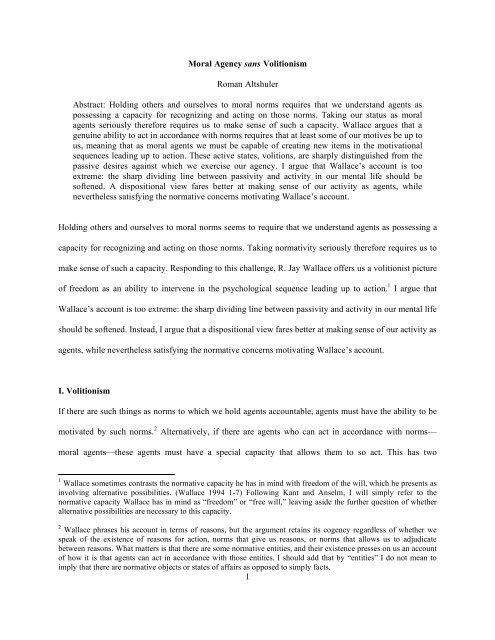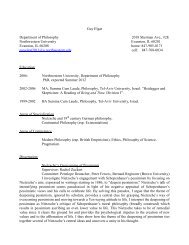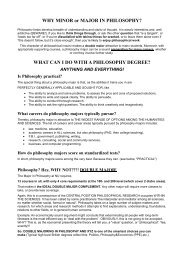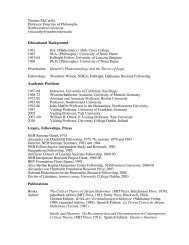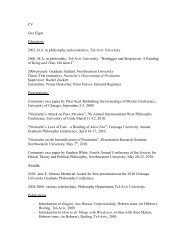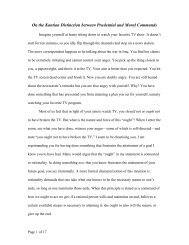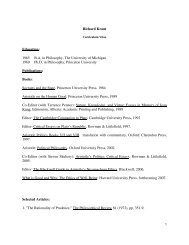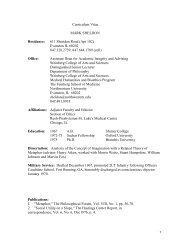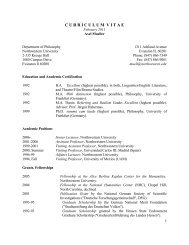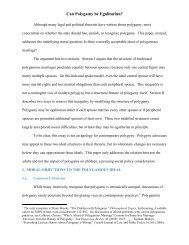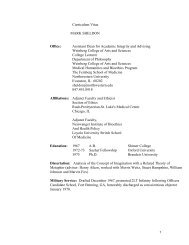Moral Agency sans Volitionism - Northwestern University
Moral Agency sans Volitionism - Northwestern University
Moral Agency sans Volitionism - Northwestern University
You also want an ePaper? Increase the reach of your titles
YUMPU automatically turns print PDFs into web optimized ePapers that Google loves.
<strong>Moral</strong> <strong>Agency</strong> <strong>sans</strong> <strong>Volitionism</strong><br />
Roman Altshuler<br />
Abstract: Holding others and ourselves to moral norms requires that we understand agents as<br />
possessing a capacity for recognizing and acting on those norms. Taking our status as moral<br />
agents seriously therefore requires us to make sense of such a capacity. Wallace argues that a<br />
genuine ability to act in accordance with norms requires that at least some of our motives be up to<br />
us, meaning that as moral agents we must be capable of creating new items in the motivational<br />
sequences leading up to action. These active states, volitions, are sharply distinguished from the<br />
passive desires against which we exercise our agency. I argue that Wallace’s account is too<br />
extreme: the sharp dividing line between passivity and activity in our mental life should be<br />
softened. A dispositional view fares better at making sense of our activity as agents, while<br />
nevertheless satisfying the normative concerns motivating Wallace’s account.<br />
Holding others and ourselves to moral norms seems to require that we understand agents as possessing a<br />
capacity for recognizing and acting on those norms. Taking normativity seriously therefore requires us to<br />
make sense of such a capacity. Responding to this challenge, R. Jay Wallace offers us a volitionist picture<br />
of freedom as an ability to intervene in the psychological sequence leading up to action. 1 I argue that<br />
Wallace’s account is too extreme: the sharp dividing line between passivity and activity in our mental life<br />
should be softened. Instead, I argue that a dispositional view fares better at making sense of our activity as<br />
agents, while nevertheless satisfying the normative concerns motivating Wallace’s account.<br />
I. <strong>Volitionism</strong><br />
If there are such things as norms to which we hold agents accountable, agents must have the ability to be<br />
motivated by such norms. 2 Alternatively, if there are agents who can act in accordance with norms—<br />
moral agents—these agents must have a special capacity that allows them to so act. This has two<br />
1 Wallace sometimes contrasts the normative capacity he has in mind with freedom of the will, which he presents as<br />
involving alternative possibilities. (Wallace 1994 1-7) Following Kant and Anselm, I will simply refer to the<br />
normative capacity Wallace has in mind as “freedom” or “free will,” leaving aside the further question of whether<br />
alternative possibilities are necessary to this capacity.<br />
2 Wallace phrases his account in terms of reasons, but the argument retains its cogency regardless of whether we<br />
speak of the existence of reasons for action, norms that give us reasons, or norms that allows us to adjudicate<br />
between reasons. What matters is that there are some normative entities, and their existence presses on us an account<br />
of how it is that agents can act in accordance with those entities. I should add that by “entities” I do not mean to<br />
imply that there are normative objects or states of affairs as opposed to simply facts.<br />
1
implications. First, moral agents must be capable of practical deliberation, understood as deliberation<br />
about what they have most reason to do. 3 Second, they must be capable of being guided by the upshots of<br />
such deliberation. In saying that moral agents must be such that they can act according to norms, Wallace<br />
holds that the “can” must be taken in a non-conditional sense. A longstanding compatibilist tradition<br />
attempts to understand “can” conditionally. That is, to say that an agent A acts according to reason X is to<br />
say that A desires to act in accordance with X. Should it be the case that Y was a stronger reason than X<br />
and A recognized this fact, we can still say that—although his desire for X was stronger than his desire<br />
for Y—A could have done Y in the sense that he would have done Y had his desire for Y been stronger<br />
than his desire for X.<br />
This conditional analysis has exercised an especially powerful influence on twentieth century<br />
compatibilism because it meshes neatly with the belief-desire theory of action, which holds that an agent<br />
A does X intentionally iff she wants D and believes that X is a means to attaining D. Such accounts,<br />
however, find it difficult to explain akrasia. An akratic agent judges that, all things considered, he had<br />
better X, but he Ys instead. The conditional analysis can claim only that, had A wanted to X more, he<br />
would have. But Wallace argues that such an account is deceptive. It is not true that A genuinely could<br />
have Xed but chose instead to Y, because given A’s existing motivations he could not have done anything<br />
but Y. (223-224) 4 If this is so, then it is equally false on the conditional analysis to say that A can act in<br />
accord with his judgment about what he has most reason to do. Rather, the situation seems to be this:<br />
given A’s desires and beliefs prior to his action, he necessarily does either X or Y on the basis of which of<br />
these he desires to do more. This is what Wallace refers to as the hydraulic theory of agency. If the<br />
hydraulic theory is right, however, it follows that A’s judgment about which he has more reason to do, X<br />
or Y, is relevant to what he will do only insofar as the belief inherent in the judgment interacts with the<br />
3 Wallace vacillates between describing practical deliberation in terms of deliberation about what agents have reason<br />
to do, what they have most reason to do, and deliberation about what to do. I am not convinced that these are<br />
equivalent, and I suspect that the last is the most typical kind of practical deliberation. This distinction, however,<br />
should not make a difference to the argument developed here.<br />
4 All references to Wallace will be by page number to essays reprinted in Wallace (2006).<br />
2
agent’s desires. But it is only A’s pre-existing desires to X or to Y that interact with the judgment to<br />
produce an action 5 ; A has, in this scenario, no ability to act in accord with or counter to his best judgment.<br />
What he does is up to his desires, not to him. If the hydraulic theory is right, we lack genuine agency.<br />
Few compatibilists still maintain the conditional account Wallace attacks, and he does not engage<br />
with the more recent, and far more nuanced versions of compatibilism put forward in the wake of<br />
Frankfurt and Strawson. 6 This does not, however, lessen the appeal of Wallace’s approach. By attacking<br />
the core assumption of standard belief-desire approaches, he succeeds in bringing out what is at stake in<br />
the free will debates. Free will, on this account, is important not in the way self-expression or creativity is<br />
important. 7 Rather, it is important because it is implicated in our practical deliberation, as well as our<br />
practices of holding others responsible. These practices presuppose the ability to guide ourselves in<br />
accordance with norms. But this ability is lacking on any account that assumes a hydraulic theory on<br />
which agents’ actions are a function of their given psychological states.<br />
Nevertheless, Wallace maintains that the belief-desire account of action is not wrong. In<br />
explaining why A did X, we do rely on causal explanations, stating the motives that caused X.<br />
Reconciling this view with a recognition of ourselves as genuine agents, however, will require us to<br />
recognize a division in the notion of motive, or desire, that we take as the causal factor in agency. Wallace<br />
argues that we need to distinguish desires in the ordinary sense, as the passive states we simply find<br />
ourselves with—what he calls “given desires”—from states such as decisions and choices, things that we<br />
do, which he groups under the category of volitions. (e.g., pp. 6, 149-150, 173) The mistake of hydraulic<br />
theories is to think that our actions are caused by given desires; recognizing genuine agency will require<br />
5 Technically, the point is not about whether A desires to X or Y, but whether A desires to D or E, where he believes<br />
that Xing will lead to D and Ying will lead to E. For the sake of simplicity, I will speak in terms of desires to X and<br />
Y.<br />
6 Wallace himself, of course, puts forward a compatibilist view inspired by Strawson and, to some extent, Frankfurt.<br />
Nevertheless, his compatibilism seems to be a bit of an outlier, and his attack on the hydraulic theory seems aimed<br />
to apply to competing compatibilist approaches as well. For a discussion of these issues and whether Wallace’s<br />
account is consistent with compatibilism, see the review of Normativity and the Will by Gert and McKenna (2008).<br />
7 The first suggestion is made by Fischer. See, e.g., (Fischer 2009). The latter is listed as a candidate for the<br />
significance of free will by Robert Kane (1996).<br />
3
us to see that our actions can instead be caused by volitions, which are subject to our direct and immediate<br />
control and allow us to intervene in the causal chain between our given desires and our actions. On this<br />
view, an agent with a set of given desires who does X nevertheless has—leaving fixed the given desires to<br />
which he was subject prior to the action—the ability to choose instead to do Y. This volitional capacity<br />
accounts, for Wallace, both for our ability to choose independently of our given desires and our ability for<br />
akratic and other sorts of irrational action, as when we choose to do something we have reason to avoid<br />
and perhaps lack even strong given desires to undertake. 8<br />
II. Troubles for <strong>Volitionism</strong><br />
Wallace takes his account to be opposed to any form of psychological determinism. In order to be genuine<br />
agents, we must be able to intervene in the motivational sequence leading up to action, so that the<br />
sequence alone does not determine the action we undertake. 9 However, even rejecting psychological<br />
determinism will not give us what we need to make sense of genuine agency. Wallace recognizes, for<br />
example, that desires, especially resilient ones, might focus our attention on particular considerations,<br />
making it more difficult for us to grasp correct reasons for action. (181) His strategy is to stress the “more<br />
difficult” clause: neither desires nor addictions make it literally impossible for us to grasp and act for<br />
correct reasons, since they interfere with but do not eliminate our volitional capacities. The line between<br />
interference and determination is a hard one to draw, however. If desires can focus our attention on<br />
particular considerations over others, they certainly increase the likelihood of our taking those<br />
considerations as decisive. Nor is it obvious that we have some ability to deliberate completely<br />
8 On this point, Wallace differs from Wolf (1980), who argues that determinism is only a problem when it leads as<br />
away from good reasons. Being determined to good, she holds, is unproblematic. Wallace, on the other hand, wants<br />
to retain the ability to explain what seems, at least, to be a common ability on our parts: the ability to do something<br />
we neither particularly want to do nor take to be worthwhile, as evidenced for example by certain cases of<br />
procrastination.<br />
9 Just how we can reject psychological determinism while accepting physical determinism, given that psychological<br />
events and states are presumably constituted by or dependent upon physical ones, is left underexplained. Instead,<br />
Wallace turns to the question of whether psychological determinism seems plausible (163-164), but he discusses its<br />
plausibility in terms of folk-psychology rather than in terms of its connection with physical determinism.<br />
4
independently of such desires, which may in fact be necessary to make at least some considerations<br />
salient for us and worth considering in the first place. Our desires may work not against, but through our<br />
deliberation, making it impossible for us to judge and act independently of them. (Katsafanas<br />
forthcoming) Nor is it clear that our deliberations or volitions are entirely up to us. We can make<br />
ourselves think, and we can make ourselves think about a particular subject, but what actual thoughts<br />
occur to us is not in our control. The occurrence of such thoughts is, instead, the means by which we<br />
exercise control. (Strawson 2003) Thus, there is a sense in which our thoughts—including both our<br />
judgments and our decisions—are tinged by a kind of passivity; they, like our desires, are something “one<br />
merely finds oneself with.” (174)<br />
This thought should lead us to a reconsideration of Wallace’s distinction between activity and<br />
passivity in our agency. The division between passive given desires and active volitions is presented as a<br />
strict dichotomy among our motivating states, but there are reasons to doubt that we can simply leave it at<br />
that. Wallace notes that given desires do have a conceptual structure that “makes it possible for them to<br />
respond to our deliberated judgments about what we have reason to do.” (149) If so, then even given<br />
desires seem to exhibit a kind of activity. Thus, as some anti-volitionists have argued, our desires<br />
represent our evaluative judgments in such a way that it makes sense to hold people responsible for their<br />
desires and not only for their explicit judgments. 10 (Arpaly and Schroeder 1999 ; Smith 2008, 2005) This<br />
is an appealing view of desires, because it does not insist on fracturing our mental life into two<br />
diametrically opposed sorts of states. 11 Moreover, Wallace’s distinction between passive and active states<br />
does not make the distinction in terms of any features of those states, whether conceptual or<br />
phenomenological. He appeals entirely to the claim that active states must exist if there are to be moral<br />
10 Of course that does not imply that we should hold people equally praiseworthy or blameworthy for all their<br />
conative states; the point is only that desires are not—simply by virtue of being desires—completely set off from our<br />
“real selves” and placed into a domain of involuntary states over which we have no control and for which we are in<br />
no way responsible.<br />
11 Wallace seems to recognize that at least some motivational states “straddle the distinction” between passivity and<br />
activity. (177) He does not, however, consider the possibility that the distinction itself may be one of degree rather<br />
than kind. That is, it is possible that some motivational states exhibit more passivity and others more activity,<br />
without it being the case that there are simply three sorts of motivational states: active, passive, and straddlers.<br />
5
agents. This consideration, however, establishes only that there must be states that are active in the<br />
relevant sense; it does not show that passive states must exist in opposition to them.<br />
Wallace’s way of breaking up motivational states does have an intuitive appeal, however. For<br />
while normative requirements do not require us to posit the existence of passive given desires, it may<br />
seem as if our experience does. To make this point, Wallace argues that given desires exhibit a resilience<br />
to change in accordance with judgment. They do not automatically match up with our value judgments; if<br />
they do, that is a matter of luck. (175) However, the same is true of many other mental states: we are very<br />
capable, as Wallace notes, of holding on to beliefs we recognize to be inconsistent with our better<br />
judgment. Nor is there reason to doubt that our beliefs about what we have reason to do may sometimes<br />
fall into this class of what we might call resilient beliefs. Moreover, as I argued above, our judgments<br />
themselves may be something passive, something we merely find ourselves with. So we have some<br />
reason to think that our judgments may be just as passive—in Wallace’s sense—as our given desires.<br />
If at least some of our judgments are no more in our control than our desires, we may note that<br />
those supposedly active entities—judgments and volitions—may sometimes turn out to be resilient not<br />
simply relative to our other beliefs, but relative to our desires as well. For example, let’s say that Kant’s<br />
grocer—not the prudent grocer, but rather than one who loves his customers—judges that he could make<br />
a killing by ripping off select shoppers and that he could easily avoid getting caught. Moreover, let us say<br />
he concludes, after long reflection, that ripping off his customers in this way would be the right thing to<br />
do (perhaps some of his customers are themselves thieves; in any case, we need not suppose here that the<br />
grocer’s judgment is correct). Yet due to his love for his customers, the grocer cannot bring himself to act<br />
on his own best judgment. Here we have a case of akrasia, no doubt, but it is akrasia of the sort Arpaly<br />
has worked out in great detail: the grocer is acting against his best judgment, but the action is more<br />
rational than it would have been had he followed his judgment. (Arpaly 2003) Or consider someone who<br />
comes up against “volitional necessities”: who judges that X would be the right thing to do, and in fact<br />
wants to do X, and yet cannot bring herself to do it. In some such cases we might think that it is the<br />
6
volition that is resilient, passive, and given. The desires, lined up with the judgments, would then appear<br />
to be the active states. Wallace could respond, of course, that to call desires that stand opposed to our<br />
volitions active is to misunderstand the nature of desires; but that would simply beg the question.<br />
III. Toward a Non-Volitional <strong>Agency</strong><br />
So just why do we need to posit free will, or a capacity to judge and act in accordance with norms?<br />
Wallace’s claim is that this capacity is presupposed in practical deliberation. 12 Most animals are likely<br />
capable of deliberating—deciding which course of action to take when presented with an option. But<br />
human deliberation involves an ability to decide not simply what to do, but also what we have reason to<br />
do, or what norms we ought to follow, and an accompanying ability to act in accordance with those<br />
norms. Unless we held ourselves to have such an ability, the task of thinking about norms and reasons<br />
would be pointless; it is only on the condition that we hold our deliberation to be potentially effective—<br />
capable of making a difference to how we act—that we engage in it. (151) But note that the deliberation<br />
need only be potentially effective. For sometimes it does seem as if we decide to act contrary to our<br />
strong given desires, and then find a sort of motivational inertia preventing the decision from having any<br />
effect.<br />
Deliberation does not lose its point, or its purchase on us, simply because it sometimes fails; we<br />
would lose reason to deliberate only if we knew that it was always pointless to do so. 13 This requirement<br />
of practical deliberation has to be distinguished from another reason sometimes raised in defense of<br />
volitionism and occasionally alluded to by Wallace: that when we act, we often feel that we could have<br />
acted differently. Thus, when I procrastinate in an akratic way, I may feel that I can or could have<br />
12 Wallace stresses that the capacity is presupposed both in our deliberation, and in our practices of holding others<br />
responsible. I focus on the first of these, in part because I think holding others responsible has no justification other<br />
than that provided from our first-person deliberation, and is thus not an essentially third-personal stance, as Wallace<br />
insists (124). Leaving out the point about responsibility, however, should make no difference to the argument here.<br />
13 My point is not that coming to have certain beliefs would cause us to simply stop deliberating altogether. Here I<br />
am only stressing that if deliberation commits us to postulating a special practical capacity, that capacity need not be<br />
one that guarantees that we can always act on the outcome of the deliberation.<br />
7
avoided the procrastination. But this feeling does not require us to postulate any ontological capacity to<br />
support it: it is perfectly consistent to suggest that at the moment I act, I do not in fact have the ability to<br />
act otherwise, and yet I feel as if I do. It is not, however, consistent to claim that I can guide myself in<br />
accordance with norms, and yet that I lack any ability to do so.<br />
The possible range of ontological commitments implied by our normative commitments, then, is<br />
not exhausted by the sort of capacity Wallace posits. On the volitionist account, our capacity gives us the<br />
ability to intervene in the sequence of psychological states leading up to action. It is, we might say, a<br />
synchronic capacity: a standing capacity to create a new motivational state, a new event, at any moment<br />
in time. 14 But the capacity could serve the same normative purpose if we conceived of it in diachronic<br />
terms. Imagine instead that our actions—as well as our judgments about what we have reason to do—<br />
proceed from dispositions. Here I do not want to commit myself to any particular way of sketching out<br />
what such dispositions might be like. We may take them to be dispositions of character, along<br />
Aristotelian lines, or we might take them to be reasons-responsive mechanisms, following Fischer and<br />
Ravizza (1998); we might even, for the sake of simplicity, think of them as standing plans or principles to<br />
which we are committed (Bratman 1999 ; Korsgaard 1996). 15 On something like this account, we would<br />
14 It is interesting to note in this regard that, while Wallace rejects agent-causal theorists’ metaphysical views—<br />
namely, that agents are substances capable of intervening in the causal order at the physical level—he retains a view<br />
of agents as defined by the ability to undertake radically undetermined actions.<br />
15 I am arguing here that the volitionist account faces serious problems, ones that a dispositional account allows us to<br />
avoid. Ultimately, however, the viability of a dispositional account will rest on our ability to determine just what<br />
dispositions of this sort come to, and clearly not all proposals will be equally suited for the task of offering an<br />
alternative to volitionism. For example, Fischer and Ravizza’s reasons-responsive mechanisms are, presumably,<br />
acquired during some period of time (usually during the socialization stage of childhood and adolescence) and<br />
remain stable after that point; a similar view about dispositions of character can be found in Jacobs (2001), and Kane<br />
(1996) sees us as shaping our character through occasional, free “self forming willings,” while the majority of our<br />
actions are simply functions of character so formed. But as I note here, views of this sort will be insufficient to offer<br />
an alternative to volitionism, since they do not allow that our dispositions be direct expressions—as well as<br />
sources—of our ongoing agency over time. That view requires an ongoing feedback loop between our dispositions<br />
and the actins and deliberations undertaken on their basis. Similarly, Korsgaard’s view, as I note below, seems to<br />
fall to the other extreme: it allows us to alter or acquire dispositions at any point through an act of identification with<br />
a principle. Other views of dispositions, perhaps more promising with regard to the aim of offering an alternative to<br />
both volitionism and the hydraulic theory, can be found in recent Sartrean attempts to explain dispositions in terms<br />
of our projects; on this, see especially Webber (2006). Ultimately, however, I suspect such an account will have to<br />
be reworked in terms of projects understood in a Heideggerian sense, which I tentatively work out in Ch. 5 and 6 of<br />
Altshuler (2010).<br />
8
not have the ability to create new volitions at any moment in time. Instead, our volitions would stem from<br />
some interaction between our perception of our surroundings, or our grasp of the situation in which we<br />
find ourselves, and our dispositions to respond in certain ways to situations and surroundings of this kind.<br />
To see how this might work, we can consider one way of hashing out the Aristotelian distinction<br />
between continence and virtue. The continent person might, for example, consider picking up the wallet<br />
she finds on the ground and pocketing the money, but she will not act on this consideration. The virtuous<br />
person, on the other hand, will not even have such a consideration occur to her. This sort of thought is<br />
behind, for example, Smith’s suggestion that a thought to pocket the money might be blameworthy, even<br />
though it is not very blameworthy provided the agent does not seriously entertain it or act on it. (Smith<br />
2005) The point of such an account is that it does not give us immediate and direct control over our<br />
motives as the volitionist would have it. This does not, however, mean that our motives are completely<br />
outside our control. Instead, it places all our motives—including our choices and decisions as well as our<br />
given desires—under the control of our character, or the mechanisms or dispositions that constitute it.<br />
Such an account avoids the problems raised by the stark division of motives into ones that are given and<br />
ones that are immediately up to us.<br />
But does a dispositional view of this sort help to account for our moral agency, as Wallace<br />
conceives of it? To do so, it would have to fulfill two requirements. First, part of the point of positing a<br />
capacity of acting according to our conception of norms was to stress that we, as agents, can respond to<br />
norms; that is, that we and not desires operating in us are in control of what we do. On the dispositional<br />
view I am proposing, this means we must have some control over our dispositions. It is not enough to say<br />
simply that our dispositions, because they coordinate our activity over time, serve to constitute our<br />
practical identity and thus “stand in” for agential activity in producing actions. 16 That sort of view is fully<br />
compatible with the sort of hydraulic theory Wallace correctly dismisses. But it is a mistake to think that<br />
the only alternative to the hydraulic theory is an ability to create psychologically undetermined motives.<br />
16 This is a paraphrase—with regard to dispositions—of the view Bratman takes with regard to plans. (Bratman<br />
2001)<br />
9
Such an ability is obscure enough; surely it is not more obscure to suggest that our character—or the<br />
dispositions and mechanisms that constitute it—may be the vehicle of our agency.<br />
Second, the other part of the point of postulating a special capacity was to account for our<br />
practical deliberation. Our deliberation must be capable of having some effect on our action; otherwise it<br />
would be pointless. This means that whatever capacity we posit to explain the role of normativity in our<br />
lives, that capacity must involve an ability to act in accordance with norms or reasons. As already noted,<br />
the capacity need not guarantee that we are at every instant capable of responding correctly to right<br />
reason: a thoroughly vicious agent, for example, may be genuinely unable to see the force of such<br />
reasons, or—seeing it—may nevertheless lack any ability to motivate himself to act in accord with it. But<br />
this does not mean that the vicious agent lacks the ability to act in accordance with practical deliberation;<br />
it means only that he lacks this ability at the moment he acts. But we can reasonably say that he can act in<br />
accordance with the dictates of correct deliberation, provided that the disposition that at the moment<br />
prevents him from doing so is one that was up to him, and one that is still up to him to change. Even the<br />
vicious agent’s practical deliberation may then be effective, not because he has the ability to decide and<br />
act correctly at any moment, but because the deliberation itself is partly constitutive of the disposition that<br />
now prevents him from acting correctly. Thus, correct deliberation may not have a direct and immediate<br />
influence on his conduct at the moment; it may, however exert its influence on his future conduct by<br />
reconstituting his character.<br />
Wallace repeatedly rejects Korsgaard’s constructivist alternative to moral realism. (Wallace 2006,<br />
2004) While I will not go into the full details of that rejection, I want to suggest that a version of the<br />
constitutivism Korsgaard couples with her constructivist approach can provide an alternative to<br />
volitionism. The hallmark of constitutivism is the view that rational norms have the source of their<br />
normativity in their embeddedness within the structure of volition. In willing, Korsgaard argues, agents<br />
are necessarily committed to certain norms, particularly norms involving the effectiveness of their willing<br />
and the unification of themselves as willing agents. Other norms, on her view, are derivable from these<br />
10
two and, since these two norms are necessarily implicated in all volitional activity, they and the norms<br />
derived from them are inescapable from the perspective of the agent. (Korsgaard 2008, 1996 ; Ferrero<br />
2009) Korsgaard’s own brand of constitutivism adds an important feature: in acting, agents necessarily<br />
constitute their selves, or their practical identities, in the process of willing. 17<br />
Wallace objects that<br />
Korsgaard’s account fails to account for akrasia: if agents must always act on norms to which they are<br />
committed, they then lack the ability to violate their norms. And indeed Korsgaard does launch a puzzling<br />
attack on the very possibility of particularistic willing, i.e., willing an action without committing oneself<br />
to a principle. 18 (Korsgaard 2009)<br />
But the culprit in Korsgaard’s view here is, in fact, her volitionism. She holds that agents<br />
necessarily, in each action, constitute themselves according to norms they accept as universally binding;<br />
and this means, also, that agents are always, each time they deliberate on an action, capable of taking up<br />
and identifying themselves with new norms. If we avoid the volitionism, however, we can still retain the<br />
core of constitutivism. Through their volitional agency—including their deliberation and action—agents<br />
constitute themselves as having certain dispositions, which in turn guide their actions. A single decision<br />
by an agent is unlikely to completely overturn the agent’s character and radically alter her pattern of<br />
behavior; this is exactly what makes volitionism problematic. 19 But the idea that agents, in deliberation<br />
and action, aim at a unified character is important: through deliberating and acting in certain ways, agents<br />
constitute themselves as entities who in the future will be drawn to deliberating and acting in similar<br />
17 The most notable other constitutivist, David Velleman, has repeatedly rejected the claim that agents constitute<br />
themselves. (Velleman 2002, 2006) I think, however, that for the present purposes the disagreement is merely<br />
apparent. Velleman is committed to the view that self-understanding is a constitutive aim of action. But surely if our<br />
self-understanding guides our rational deliberation, then the reverse applies as well. Insofar as our practical<br />
deliberation (and its outcomes) in turn shapes our self-understanding, which then shapes further practical<br />
deliberation, it is clear that in action agents do constitute their own practical identities or agential selves. That<br />
another, metaphysical, level of selfhood is not thus constituted is beside the point.<br />
18 See 84 ff. in Wallace (2006) for a discussion and rejection of this view. I do not mean to imply that the point<br />
about akrasia is Wallace’s only, or even most significant, argument against Korsgaard’s approach, which he has<br />
addressed repeatedly in a number of publications and talks.<br />
19 This is not to deny that agents sometimes do act completely out of character. But there are familiar arguments,<br />
originating in Hume’s Treatise, to the effect that such actions must be random in a way that seems to rule out<br />
control, freedom, and responsibility.<br />
11
ways. Thus, they constitute themselves over time, thereby constituting both their deliberative activity and<br />
their desires. When agents act in akratic ways, this view of constitutivism can easily account for that fact:<br />
the agents have not yet achieved a unified character, so that some of their volitional elements are still not<br />
aligned with their overall judgment. But insofar as the agents’ deliberation and action constitute their<br />
dispositions, they have partial—if not direct and immediate—control over their volitional states and the<br />
outcome of deliberation.<br />
Such an account allows us, contra volitionism, to avoid the thought that the will is a purely active<br />
capacity lined up against the passive elements of our mental life and capable of creating new elements at<br />
any moment. Instead, we can imagine our volitional lives as both passive and active, with agency itself<br />
being a temporally extended process that involves slowly—through deliberation and action—<br />
transforming the resilient machinery of one’s mental life into a unified volitional capacity. Despite<br />
lacking the ability to create new motivations on the spot, however, this capacity can serve the explanatory<br />
purposes required by our normative commitments. Insofar as agents deliberate about norms and act on<br />
them, they constitute themselves as the sorts of agents whose desires line up with their judgments. This<br />
process may be difficult, relying on habituation and the gradual bringing to bear of one’s mental<br />
framework on the most resilient items within it. But the fact that our desires do not always respond to our<br />
judgments should not mislead us into believing that any match between them is nothing but a matter of<br />
luck.<br />
12
References<br />
Altshuler, Roman. 2010. An Unconditioned Will: The Role of Temporality in Freedom and <strong>Agency</strong>.<br />
Doctoral dissertation, SUNY Stony Brook.<br />
Arpaly, Nomy. 2003. Unprincipled virtue : an inquiry into moral agency. Oxford ; New York: Oxford<br />
<strong>University</strong> Press.<br />
Arpaly, Nomy, and Timothy Schroeder. 1999. Praise, Blame and the Whole Self. Philosophical Studies<br />
93 (2):161-188.<br />
Bratman, Michael. 1999. Faces of Intention: Selected Essays on Intention and <strong>Agency</strong>. Cambridge:<br />
Cambridge <strong>University</strong> Press.<br />
———. 2001. Two Problems About Human <strong>Agency</strong>. Proceedings of the Aristotelian Society 101<br />
(3):309-326.<br />
Ferrero, Luca. 2009. Constitutivism and the Inescapability of <strong>Agency</strong>. Oxford Studies in Metaethics<br />
4:303-.<br />
Fischer, John Martin. 2009. Free Will, Death and Immortality: The Role of Narrative. In Our Stories:<br />
Essays on Life, Death, and Free Will. New York: Oxford <strong>University</strong> Press.<br />
Fischer, John Martin, and Mark Ravizza. 1998. Responsibility and Control. New York: Cambridge<br />
<strong>University</strong> Press.<br />
Gert, Joshua, and Michael McKenna. 2008. Review of Normativity and the Will. The Philosophical<br />
Quarterly 58 (232):559-564.<br />
Jacobs, Jonathan. 2001. Choosing Character: Responsibility for Virtue & Vice. Ithaca: Cornell <strong>University</strong><br />
Press.<br />
Kane, Robert. 1996. The Significance of Free Will. New York: Oxford <strong>University</strong> Press.<br />
Katsafanas, Paul. forthcoming. Activity and Passivity in Reflective <strong>Agency</strong>. In Oxford Studies in<br />
Metaethics, edited by R. Shafer-Landau. Oxford: Oxford <strong>University</strong> Press.<br />
Korsgaard, Christine. 1996. The Sources of Normativity. Cambridge: Cambridge <strong>University</strong> Press.<br />
———. 2008. Self-Constitution in the Ethics of Plato and Kant. In The Constitution of <strong>Agency</strong>. New<br />
York: Oxford <strong>University</strong> Press.<br />
———. 2009. Self-Constitution: <strong>Agency</strong>, Identity, and Integrity. New York: Oxford <strong>University</strong> Press.<br />
Smith, Angela M. 2005. Responsibility for Attitudes: Activity and Passivity in Mental Life. Ethics 115<br />
(2):236-271.<br />
———. 2008. Control, Responsibility, and <strong>Moral</strong> Assessment. Philosophical Studies 138 (3):367-392.<br />
Strawson, Galen. 2003. Mental Ballistics or the Involuntariness of Spontaneity. Proceedings of the<br />
Aristotelian Society 103 (3):227-256.<br />
Velleman, J. David. 2002. Identification and Identity. In Contours of <strong>Agency</strong>: Essays on Themes from<br />
Harry Frankfurt, edited by S. Buss and L. Overton. Cambridge, MA: MIT Press.<br />
———. 2006. So It Goes. The Amherst Lecture in Philosophy 1:1-23.<br />
Wallace, R. Jay. 1994. Responsibility and the <strong>Moral</strong> Sentiments. Cambridge: Harvard <strong>University</strong> Press.<br />
———. 2004. Constructing Normativity. Philosophical Topics 32:451-476.<br />
———. 2006. Normativity and the Will. New York: Oxford <strong>University</strong> Press.<br />
Webber, Jonathan. 2006. Sartre's Theory of Character. European Journal of Philosophy 14 (1):94-116.<br />
Wolf, Susan. 1980. Asymmetrical Freedom. Journal of Philosophy 77:151-166.<br />
13


